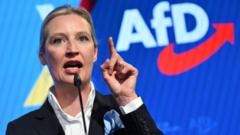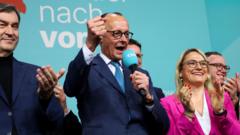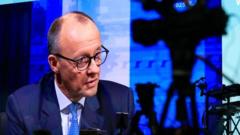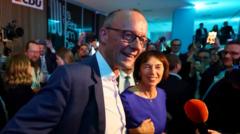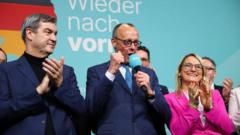In a surprising turn of events, Die Linke, led by the dynamic Heidi Reichinnek, emerged as one of the significant players in Germany's latest elections, reflecting the shifting political landscape influenced by young voters and rising conservatism.
Germany's Election Results: A Resurgence for Die Linke Amidst Conservative Backlash

Germany's Election Results: A Resurgence for Die Linke Amidst Conservative Backlash
The recent German parliamentary elections have seen the far-left party Die Linke make an unexpected comeback, gaining nearly 9 percent of the vote and solidifying its presence in the Bundestag.
Heidi Reichinnek, a 36-year-old political figure with a vibrant social media presence, has captured the attention of voters in Germany, especially among the youth. A month before the elections, Die Linke faced dismal predictions regarding its chances of securing a spot in the Bundestag, with analysts suggesting it might not overcome the crucial 5 percent threshold. However, in a remarkable twist, the party garnered nearly 9 percent of the vote, winning 64 parliamentary seats.
The increase in support for Die Linke can be attributed to a combination of factors, including discontent with conservative immigration policies, rising living costs, and the party's ability to resonate with younger voters who are increasingly concerned about the political direction of the country. As conservative parties, especially the Christian Democrats led by Friedrich Merz, adopt harsher stances on immigration, Die Linke positioned itself as a progressive alternative advocating for social justice and equity.
Heidi Reichinnek's rise in popularity is also fueled by her engaging social media strategy, utilizing platforms like TikTok and Instagram to spread her message, attract younger constituents, and advocate for a more inclusive approach to governmental policies. This dynamic political engagement symbolizes a broader pushback against the prevalent right-leaning sentiments within German politics, making Die Linke a vital player in the upcoming legislative discussions.
In the context of a more conservative Bundestag—with parties like the Alternative for Germany (AfD) doubling their vote share—Die Linke's resurgence could serve as a significant counterbalance, highlighting the demands of liberal, progressive voters seeking representation in governmental affairs. The stage is set for an intriguing political landscape as Germany prepares for what appears to be a rightward shift in policy, with Die Linke poised to voice the concerns of those opposing such trajectories.


